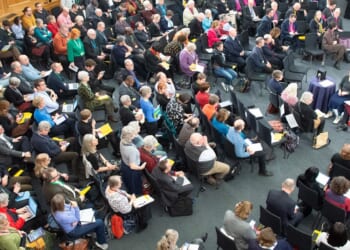
While significant majorities of Evangelicals, black Protestants and Americans in the South continue to hold fast to literal belief in Scripture, a new study has found that nearly half of American adults see the Bible as a collection of helpful but “ancient myths” that are “not literally true.”
A majority of Americans also believe worshiping at home alone or with their family is an acceptable replacement for attending church services, while significant minorities don’t believe in the resurrection or that Jesus is even God.
The findings of the study are reflected in The Ligonier State of Theology 2025 report conducted by Lifeway Research. Some 3,001 American adults were surveyed between Jan. 6-15, with a 95% confidence that the sampling error from the survey does not exceed +1.9%.
Their responses revealed more nuanced and syncretic beliefs about God than previous generations, most of whom viewed the Bible as the literal Word of God.
A collective 48% of Americans either strongly agree or somewhat agree that “The Bible, like all sacred writings, contains helpful accounts of ancient myths but is not literally true.” A slightly lower share, 43%, strongly or somewhat disagreed with the statement. Another 8% said they were not sure.
Americans in the South, Evangelicals and those who attend church at least once or twice per month were among the groups found to be the most likely to disagree with the statement that the Bible is “myth.”
Individuals that live in large cities and had household incomes above $75,000 annually were more likely to agree with the statement that the Bible isn’t “literally true” than lower-income adults.
Less than half of respondents also said they either strongly agree (31%) or somewhat agree (18%) that “The Bible is 100% accurate in all that it teaches.” A collective 44% said they either strongly disagree (28%) or somewhat disagree (16%). While another 6% said they are not sure.
Significant minorities of American adults also do not see God as a perfect being. When presented with the statement, “God is a perfect being and cannot make a mistake,” only 53% of respondents strongly agreed, while 13% somewhat agreed. Some 17% of American adults strongly disagree that God is perfect and another 9% say they somewhat disagree, while 8% said they just aren’t sure.
When asked to respond to the statement, “There is one true God in three persons: God the Father, God the Son, and God the Holy Spirit,” only 55% of respondents strongly agreed with it. Some 16% said they somewhat agree. A 5% share of respondents said they somewhat disagree, 15% strongly disagree, and 10% said they aren’t sure.
A majority of U.S. adults also believe that “God accepts the worship of all religions.” Some 44% of respondents strongly agree with this statement, while 20% said they somewhat agree.
Twenty-three percent of respondents disagreed with the statement, including 16% who strongly disagreed and 7% who somewhat disagreed. Another 12% weren’t sure.
Some 48% of American adults in the study also agree that “Jesus was a great teacher, but he was not God.” That share was much larger than the collective 40% of respondents who either strongly disagree or somewhat disagree with the statement. Another 11% said they are unsure whether Jesus was just a man or both man and God.
Only 51% of respondents strongly agree that “God created marriage to be between one man and one woman,” while 14% somewhat agree, 7% somewhat disagree, 22% strongly agree, and 6% aren’t sure.
Some 52% of Americans agree that “Sex outside of traditional marriage is a sin,” with 32% strongly agreeing with that position. A significant minority of 44% expressed disagreement, as 30% said they strongly disagree, while 14% somewhat disagree.
The survey also reflects deep divisions among American adults on issues like transgenderism. When asked for their position on the statement, “People should be able to choose their gender regardless of their biological sex,” some 38% expressed some level of agreement.
A share of 22% strongly agreed with the statement, while 16% somewhat agreed. More than half, however, expressed some disagreement, including 42% who strongly disagree and 12% who somewhat disagree. Another 9% said they were “not sure.”
More than 40% of U.S. adults also expressed some level of agreement that “The Bible’s condemnation of homosexual behavior doesn’t apply today.” Some 26% said they strongly agree with that position, while 15% somewhat agree. Another 33% expressed strong disagreement with the position, while 13% said they somewhat disagree, suggesting that less than half of American adults today support the Bible’s condemnation of homosexuality. Some 14% of respondents couldn’t decide if they agree or disagree with the statement.
The findings of the survey also show that despite the varied responses to the Bible, half of Americans still believe it can be used as a manual for life. When presented with the statement, “The Bible has the authority to tell us what we must do,” 28% of respondents strongly agree, while 22% said they somewhat agree. Another 44% of respondents expressed disagreement, while 5% weren’t sure.
Contact: leonardo.blair@christianpost.com Follow Leonardo Blair on Twitter: @leoblair Follow Leonardo Blair on Facebook: LeoBlairChristianPost

















